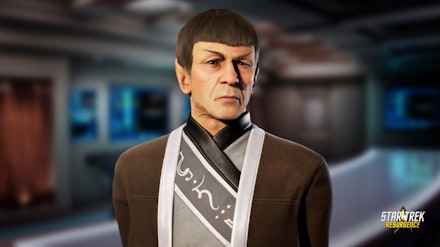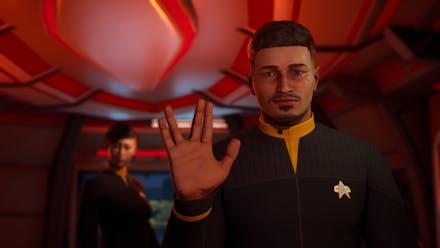Platforms: PS5, PS4, Xbox Series X|S, Xbox One, PC
It's strange to realise that Star Trek, a franchise that arguably works best on television where an episodic format allows for greater exploration of characters, themes, and philosophies, never got the Telltale Games treatment during the heyday of episodic, narrative driven gaming. Warp to 2023 though, and developer Dramatic Labs – formed by former Telltale CEO Kevin Bruner and with plenty of staff moving over with him – is correcting that mistake with Resurgence. Thankfully, there's no wait between chapters though, as this is a complete branching tale delivered in one go.
Set after Star Trek: Nemesis, Resurgence puts you in the shoes of First Officer Jara Rydek, a Starfleet Academy ace who graduated top of her class, and Carter Diaz, an engineering whiz. Both are aboard the USS Resolute, a recently repaired science vessel under the command of Captain Solano, with Jara struggling to win over her new crewmates, and Diaz juggling an understaffed engineering department and perhaps a few too many problems to solve before the ship is space-ready again.
For Trek fans, it's all immediately recognisable territory, with a crew of likeable if disparate personalities to get to know, and relationships to form with them as both playable characters. The core mission is a diplomatic one, engaging in peace talks between the Alydians and the Hotari, two races at odds over access to a dilithium mine. With foresight, the disagreement and its potentially fractious outcomes may feel slightly poignant, given what we know happens to dilithium by the time of Discovery season three, but it's a strong starting point before affairs spiral out into conspiracy and deeper interplanetary politics.

You alternate control between the two leads, giving a greater insight into the operations of the Resolute. It's not just switching between issuing commands as Jara and fixing warp coils as Carter though – decisions made by one can impact the other, even when not directly interacting. Across the game, you'll uncover a host of personal and professional problems, for the leads as well as their crewmates. Key decisions will impact how others view you – if Carter is too flippant with his overly logical Vulcan department head, for instance, it'll be remembered and influence later conversations. You'll only have a short window to choose a response for any decision, which both keeps dialogue breezy and prevents players ruminating too much on the potential outcomes.
In an interesting diversion for the narrative adventure genre, there's no morality system in Resurgence. Choices may be politically loaded or impact the lives of the rest of the crew, if not entire cultures, but it’s not divided into a dichotomy of mawkish good or cackling evil. If anything, the game trusts in the inherent morality of the Trek universe, of Roddenberry's goal of "infinite diversity in infinite combinations", of treating others with compassion as a first response. Whether you actually follow those tenets in the game or not is up to you, of course.
Even in its more active sequences, Resurgence keeps you thinking.
It's not all talk, talk, talk, though. There are plenty of puzzles to solve, often using tricorder functions, which add some satisfying brain teasers beyond moral quandaries and relationship management. These are let down slightly by the tricorder beeping when in proximity of anything that can be scanned, whether you've already done so or not, which can be both distracting and misleading. Resurgence also makes use of the Star Trek licence to the fullest, with the occasional shuttle to pilot or more action-packed phaser shoot-out, but even these are often in service to the choice-based gameplay. Do you set phasers to stun or kill? What are the repercussions of that? How does it influence what comes next? Even in its more active sequences, Resurgence keeps you thinking.
It all looks rather marvellous, too. The Resolute itself is all Next Generation-era sleek lines and minimalist interiors, while the sheer majesty of nebulae and alien worlds is often jaw-droppingly beautiful. Character models are impressively detailed, and not just for major characters – fan-favourite alien races pepper backgrounds, instantly recognisable from the various shows. Walking animation is a bit ropey at times, mainly due to some inconsistency over where you can run or not – professional decorum sometimes locks you into a painfully slow stroll through ship corridors, which can look and feel incredibly stilted – but overall, it's all lovely to look at. Even the system UI echoes the LCARS display panels seen on TNG, DS9, and Voyager.
Between the previous output of Telltale Games and its peers, including the likes of Life is Strange, you'll probably have an idea by now if these sorts of interactive narrative adventures are your cup of Earl Grey. If you want a Trek game that's more in keeping with the action-heavy Kelvin timeline Star Trek films (the Chris Pine ones, for non-Trekkies), this won't be for you.
If, however, you're looking for something a touch more cerebral, and that captures the essence of Trek – or certainly a particular era of Trek – better than almost any other game has, this is a must. Star Trek: Resurgence doesn't reinvent the wheel for the adventure genre, but it does reshape it in interesting ways.
